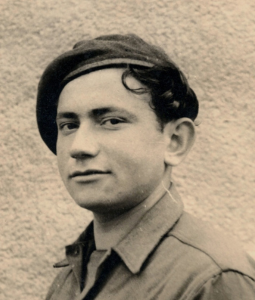

“Somebody kept saying they saw some Red Cross panel trucks outside – it’s British soldiers. When I heard that… it’s the first time I felt I was human. That it’s over. I was too weak to even stand up.”
Martin was born in the Czechoslovakian village of Tereshva in 1927, but home was across the Tisza River in Săpînţa, Romania, a town with about 100 Jewish families. In 1940, Romania was forced to cede northern Transylvania to Hungary, and conditions for the Jews deteriorated rapidly: public school was forbidden, businesses confiscated, travel restricted, and, ultimately, forced labor.
Martin was 15 in 1944 when the Jews were taken by wagon to Tyachev. This was a ghetto in every sense of the word. After several weeks, Martin’s family was put on a train for two days and nights, arriving at Auschwitz II (Birkenau). This was the last time Martin and his older brother, Moshe, would ever see his parents, two sisters, and two younger brothers again.
The boys were settled into deplorable barracks, when guards came looking for prisoners with skills. Anxious to get out, Martin and Moshe called themselves mechanics, and after a week, were transferred to a labor camp in Bunzlau, Germany. It was here that Martin was given the number 46006 as his identity. The boys worked mixing cement to build foundations for factory walls. Had he remained at Bunzlau, Martin would have been freed by the Soviets in a few days. Instead, Martin was marched for five or six weeks through Germany to Görlitz, Leipsig, then Nordhausen. Of the 100 men who began the journey, fewer than 25 survived. Moshe stayed at Bunzlau and was liberated from there, eventually immigrating to Israel, but died shortly thereafter, succumbing to the ravages of his concentration camp hardships.
Skeletally thin and so weak that he could hardly stand, Martin was put on a train to Bergen-Belsen. Several days later, on April 15, 1945, the British liberated the camp. Martin is certain that he would not have survived another day. He was taken by medical truck to Celle for recuperation and then brought back to Bergen-Belsen, which had been organized into a Displaced Persons (DP) Camp.
An aunt and uncle in New York saw a notice in the Jewish paper about Martin’s search for relatives; they sponsored his immigration. On March 3, 1948, Martin arrived in New York City. He was drafted by the US Army during the Korean conflict and after discharge, settled in Birmingham, married Sylvia Gerber, and had one son. Sylvia died suddenly in 1967. In 1974, Martin met and married Shirley Beck Zalla, also widowed with one son. Together they became a family. Martin worked at Berman Brothers Iron and Metal Company for 35 years.
Click on any image below to enlarge and view captions.
All photos on this website are the property of the Alabama Holocaust Education Center archive. Please contact us for permission before using or sharing any images.
04/21/1929
Martin said he was born in 1927, but post-war, in DP Camp Herzog, it was recorded as 1929. All subsequent papers carried this new date.
Săpînţa
Also: Săpînţa [Rom], Szaploncza [Hun], Spinka ספינקא [Yid], Sapunka [Slov], Szaplonca, Săpânta
While the Aron’s lived in Săpînţa, Martin was actually born across the Tisza River in Teresva, Czech Republic (now Ukraine).
Also: Teresva [Ukr, Slov], Teresif [Yid], Taracköz [Hun], Tarasovka [Rus], Theresiental [Ger], Taraczköz, Tereshva, Tereszva, Tyereszva, Tereswa
Leah Hendel Tzig (Alt: Cig, Czik)
(1897 Bedevlja, Austria-Hungary – 1944 Auschwitz)
Mendel Baer Aron
(1892 Săpînţa, Romania – 1944 Auschwitz)
Bailah Aron
(1922 – 1944 Auschwitz)
Moshe Shmuel Aron
(1924 – 2004 Israel)
Rochel (Rachel) Eka Aron
(circa 1931 – 1944 Auschwitz)
Pinchas Aron
(circa 1933 – 1944 Auschwitz)
David Baruch Aron
(circa 1938 – 1944 Auschwitz)
Sylvia Gerber
(08/03/1921 – 05/11/1967)
Shirley A. Beck
(March 1942 – October 2018)
Patricia Joyce Gepner Aaron (Spouse: Israel Pancer)
Born 1944
Marvin Barry Aaron (Spouse: Jennifer Schenker)
Born 1965
David Harold Zalla Aaron
Born 1966
1951-2018
Tyachev
(1944)
Also: Tiacheva, Tesco [Yid], Tachovo, Tetsh [Ger], Tech [Hung], Tacovo [Czech], Tachovo, Tiaczovo [Pol]), Tiachevo [Rus]) and Tiachev [Ukr]
Auschwitz II/Birkenau
(05/29/1944 – Early June 1944)
Bunzlau (Sub-camp of Gross-Rosen)
Prisoner #46006
(early June 1944 – circa March 1944)
Nordhausen
(circa March 1944 – circa 04/08-11/1945)
Bergen-Belsen
(circa 04/8-11/1945 – 04/15/1945)
Bunzlau (02/11/1945) to Görlitz, then Leipzig, then Nordhausen (03/15/1945), then Bergen-Belsen
British /April 15, 1945 / Bergen-Belsen, Germany
Bergen-Belsen [British Zone]
(1945-46)
Camp Herzog, Hessisch-Lichtenau, near Kassel, Germany [US Zone]
(1947)
Evelyn Aron Goldstein (Spouse: Sam Goldstein),
Paternal Aunt
US Army / Camp McClellan – Anniston, AL
Chemical Corps
(December 1950-December 1952)
1951-2018
USC Shoah Foundation
Interview #28325
April 27, 1997 | Birmingham, AL
Alabama Holocaust Education Center
“Children of the Holocaust” (2008)
(4:29)
AHEC Darkness into Life Exhibit